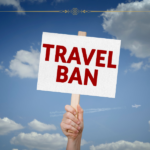Beyond practical advice about entry requirements and health risks across 226 overseas destinations, the FCDO specifically identifies locations where travelers should not travel under any circumstances – information that could save lives and prevent legal complications.

These travel advisories aren’t mere suggestions. Ignoring them could leave you without insurance coverage in dangerous territories, potentially facing catastrophic financial and personal consequences. Here’s the comprehensive overview of where the FCDO currently advises against travel, from complete country bans to regional restrictions.
Complete Country Restrictions: When Entire Nations Are Off-Limits
Several countries have earned the FCDO’s strongest warning: avoid travel to the entire nation. These complete bans reflect volatile security situations, political instability, or other significant risks to travelers.
Afghanistan tops this list, with the FCDO emphasizing that “the security situation is volatile” and “travel throughout Afghanistan is extremely dangerous.” Border crossings may be closed, leaving travelers stranded in potentially life-threatening circumstances.
Belarus represents another complete travel ban, though for different reasons. The FCDO warns that travelers face “a significant risk of arrest if you have at any time engaged in any activity now considered illegal by the Belarusian regime.” This broad definition creates unpredictable legal dangers for any visitor.
Haiti features prominently among nations entirely off-limits. The Caribbean country’s ongoing political turmoil, gang violence, and humanitarian crisis have created conditions too dangerous for visitors.
Iran joins the list of complete travel bans. Complex geopolitical tensions, arbitrary detention risks, and unpredictable security situations make this historic nation currently inaccessible to travelers following official guidance.
Lebanon has also earned a complete travel restriction. Recent regional conflicts have dramatically heightened dangers throughout the country, with the situation remaining fluid and unpredictable.
Russia represents one of the most significant complete country bans. Deteriorating diplomatic relations and the ongoing conflict with Ukraine have created substantial risks for travelers across all Russian territories.
Syria continues to be entirely off-limits due to the protracted civil conflict and presence of multiple armed groups. The FCDO remains unequivocal that no part of Syria should be considered safe for travel.
Regional Restrictions: When Parts of Countries Pose Significant Dangers
While some nations face complete travel bans, many more have specific regions the FCDO identifies as too dangerous for visitors. These targeted advisories allow travelers to visit safer areas while avoiding zones with heightened risks.
African Continental Concerns
Africa features prominently in regional travel restrictions, with numerous countries having zones travelers should avoid.
In Algeria, the FCDO advises against travel within 30km of borders with Libya, Mauritania, Mali, Niger, and Tunisia. These border regions face heightened security threats from cross-border militant activities.
Burkina Faso presents a complex advisory: all travel is discouraged except to the capital, Ouagadougou, and even there, only essential travel is advised, restricted to areas within the city’s toll booths. This reflects the “threat of terrorist attacks and terrorist kidnap, and the unstable political situation.”
Angola’s Cabinda Province (excluding Cabinda city) and border areas in Lunda Norte Province are subject to travel warnings due to ongoing insurgent activities.
In Nigeria, Africa’s most populous nation, various regions face travel restrictions due to terrorism, kidnapping, and violent crime risks, particularly in northern and northeastern states.
Sudan’s ongoing civil conflict has created numerous no-go zones, with the FCDO specifically advising against travel to parts of the country experiencing active fighting and humanitarian crises.
South Sudan, similarly, remains entirely off-limits due to widespread violence and lawlessness that creates unacceptable risks for visitors.
Mali has extensive regional restrictions, primarily due to terrorist activities and kidnapping risks in areas outside government control.
The Democratic Republic of Congo features areas where all travel is discouraged due to armed group activities and political instability in eastern regions.
Egypt, despite being a popular tourist destination, has specific areas where travel is discouraged, primarily in the North Sinai region and other border areas where security forces combat militant groups.
Chad’s border regions with neighbors like Sudan and Libya are designated as areas to avoid due to cross-border violence and terrorist threats.
Tanzania, particularly its border with Mozambique, faces travel advisories due to militant activities that occasionally spill across boundaries.
Mozambique itself has regions where the FCDO advises against all travel, particularly in Cabo Delgado province, where an insurgency continues to destabilize communities.
Tunisia’s border regions with Algeria and Libya remain under travel advisories due to terrorism risks and unstable security conditions.
Middle Eastern Complexities
The Middle East features several countries with specific travel restrictions due to regional conflicts and security concerns.
Israel has designated areas where the FCDO advises against travel, particularly along certain border regions where security incidents occur regularly.
The Occupied Palestinian Territories have specific areas designated as no-travel zones due to ongoing conflict and security operations.
Iraq presents a complex patchwork of advisories, with numerous provinces under complete travel bans, including parts of Anbar, Basra (except Basra city), Diyala, Kirkuk, Ninawa, and Salah al-Din provinces. The FCDO also advises against travel to Sadr City in Baghdad, areas south of Baghdad’s Airport Road, and territories within 30km of federal Iraq’s borders with Iran, Syria, Saudi Arabia, and Kuwait.
Jordan, generally considered one of the region’s more stable countries, nonetheless has border areas where travel is discouraged due to spillover risks from neighboring conflicts.
Saudi Arabia has specific regions, particularly near the Yemen border, where travel is discouraged due to cross-border attacks and security incidents.
Yemen remains largely off-limits due to the ongoing civil war, extreme humanitarian crisis, and presence of multiple armed groups with shifting territorial control.
Asian Security Concerns
Asia features several countries with specific regional travel advisories that travelers should note.
The Philippines has regions, particularly in the southern islands of Mindanao and the Sulu Archipelago, where terrorism, kidnapping, and militant activities create significant dangers.
Myanmar (Burma) has areas under travel restrictions due to ethnic conflicts, political instability, and military operations in border regions.
Indonesia, despite being a popular tourist destination, has specific areas where travel is discouraged, primarily in certain parts of Papua province where separatist movements operate.
North Korea permits limited tourism under strict controls, but the FCDO advises against all but essential travel due to the unpredictable nature of the regime and potential for arbitrary detention.
Pakistan has border regions and territories where security concerns create unacceptable risks for travelers, though major cities and tourist destinations may remain accessible.
European Border Tensions
Even within Europe, several regions face travel advisories due to ongoing conflicts or border tensions.
Ukraine has substantial areas under travel advisories due to the active conflict with Russia, with eastern regions and Russian-occupied territories completely off-limits to travelers.
Moldova has specific regions, particularly Transnistria, where travel is discouraged due to the area’s unrecognized status and lack of Moldovan government control.
Armenia and Azerbaijan both have border regions under travel advisories due to ongoing tensions and occasional military exchanges between the two countries. The FCDO specifically advises against all travel within 5km of their shared border, as well as travel along the M16/H26 road between the towns of Ijevan and Noyemberyan in Armenia due to these border tensions.
Georgia has regions, including the separatist areas of South Ossetia and Abkhazia, where travel is discouraged due to ongoing tensions and lack of recognized government control.
Turkey has border areas with Syria where travel is discouraged due to terrorism risks and cross-border incidents.
Latin American Challenges
Several Latin American countries have regions where the FCDO discourages travel due to crime, insurgency, or civil unrest.
Venezuela has areas under travel restrictions due to extreme crime rates, political instability, and economic collapse that has created humanitarian challenges.
Colombia, despite significant security improvements in recent years, still has regions where drug trafficking, guerrilla groups, and paramilitary organizations create unacceptable risks.
Mexico has specific states and regions where drug cartel violence and kidnapping risks lead to travel advisories, though popular tourist destinations generally remain accessible.
Brazil has areas in the Amazon region where travel is discouraged due to environmental crimes, illegal mining, and limited government presence.
Ecuador has border regions with Colombia that face travel restrictions due to spillover from Colombian conflicts and criminal activities.
Peru has areas, particularly in cocaine-producing regions and border zones, where travel is discouraged due to narcotics trafficking and limited government control.
Understanding “All But Essential Travel” Advisories
Beyond complete travel bans, the FCDO issues a more moderate warning against “all but essential travel” to certain destinations or regions. These advisories recognize that while risks exist, legitimate reasons for travel might outweigh them in specific circumstances.
New Caledonia currently falls under this advisory, reflecting political tensions and civil unrest that have created potential risks for visitors to this Pacific territory.
Bangladesh has regions where only essential travel is advised, primarily due to political demonstrations, ethnic tensions, and the risk of terrorism in specific areas.
Thailand, particularly southern border provinces near Malaysia, faces similar advisories due to ongoing insurgent activity that occasionally targets public places.
Malaysia’s eastern Sabah region, bordering the southern Philippines, carries an advisory against non-essential travel due to kidnapping risks from militant groups operating across maritime borders.
Papua New Guinea has provinces where only essential travel is advised due to tribal fighting, crime, and limited government control in remote areas.
Ghana has border regions where non-essential travel is discouraged due to cross-border crime and occasional security incidents.
Kenya’s border with Somalia and certain northern counties face advisories against non-essential travel due to terrorism risks from Somalia-based groups.
Kosovo has specific municipalities where only essential travel is advised due to ethnic tensions and potential for civil unrest.
Laos has regions where the FCDO discourages non-essential travel, particularly in areas with unexploded ordnance from historical conflicts.
Guatemala has zones, primarily along drug trafficking routes, where only essential travel is advised due to extreme crime rates and limited police presence.
Insurance Implications: The Financial Risks of Ignoring Advisories
Perhaps the most practical consequence of traveling against FCDO advice is the invalidation of standard travel insurance policies. Most insurers explicitly exclude coverage for destinations under official government travel warnings, leaving travelers financially vulnerable in regions already classified as dangerous.
This insurance gap creates potentially catastrophic financial exposure. Medical evacuations from conflict zones can cost tens of thousands of pounds. Legal difficulties in countries with opaque judicial systems might require substantial resources for resolution. Property crimes against travelers in high-risk regions often go unresolved, creating unrecoverable losses.
Some specialized insurance providers offer coverage for travel to restricted regions, but these policies come with significant premiums and often still contain substantial exclusions. Even with specialized coverage, the practical difficulties of accessing assistance in regions under travel advisories can make insurance benefits theoretical rather than practical.
Making Informed Decisions
The FCDO’s travel advisories represent the government’s assessment of risks to its citizens abroad, drawing on diplomatic, intelligence, and security information unavailable to the general public. These advisories merit serious consideration, even for experienced travelers.
However, advisories also require contextual understanding. Some countries have specific regions under advisory while major tourist destinations remain safe. Others may have countrywide advisories due to specific risks that might not affect certain types of travelers.
Regular updates to travel advisories mean that situations can improve or deteriorate rapidly. Checking the FCDO website before booking travel and again shortly before departure provides the most current information for decision-making.
For those with compelling reasons to travel to restricted regions – family emergencies, professional obligations, or humanitarian work – thorough preparation becomes essential. This includes securing specialized insurance when possible, establishing reliable local contacts, creating detailed communication plans, and registering with the nearest consulate.
Beyond the FCDO: International Perspectives on Travel Safety
While the FCDO provides comprehensive guidance for British nationals, comparing advisories from multiple countries offers additional perspective on travel risks. The United States Department of State, Australia’s Department of Foreign Affairs and Trade, and Canada’s Global Affairs department all publish their own travel advisories, sometimes with varying assessments of the same destinations.
These differences reflect each country’s diplomatic relationships, intelligence sources, and risk tolerance. Where multiple governments agree on travel restrictions, the consensus suggests particularly serious concerns that travelers should heed regardless of nationality.
Conclusion: Balancing Adventure with Prudence
Responsible travel requires balancing the human desire for exploration against genuine safety concerns. The FCDO’s travel advisories provide a crucial framework for this assessment, identifying destinations where risks have reached levels the British government considers unacceptable.
While adventure often involves embracing uncertainty, distinguishing between manageable travel challenges and genuine dangers requires objective information. The comprehensive guidance from the FCDO offers precisely this perspective, helping travelers make informed choices that protect their safety while satisfying their wanderlust in a complex global landscape.
The list of restricted destinations will inevitably evolve as global conditions change. Some currently dangerous regions may stabilize, while new conflicts or security concerns could emerge elsewhere. The prudent traveler checks current advisories before each international journey, recognizing that safety information requires currency to remain valuable in travel decisions.




